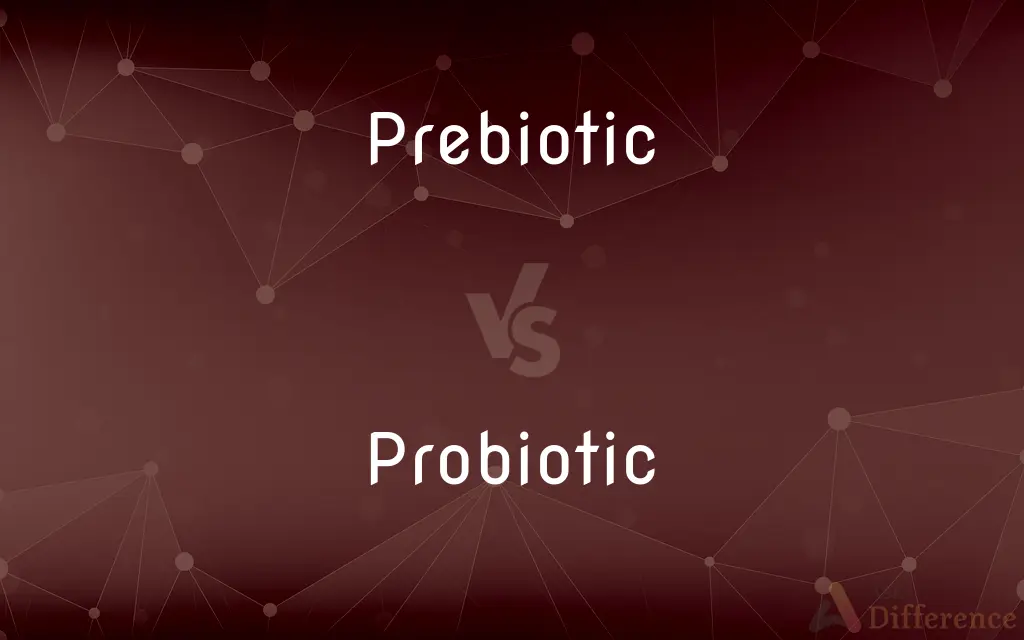Prebiotic vs. Probiotic — What's the Difference?
By Fiza Rafique & Urooj Arif — Published on September 8, 2024
Prebiotics are dietary fibers that feed beneficial gut bacteria, while probiotics are live beneficial bacteria that improve gut health.

Difference Between Prebiotic and Probiotic
Table of Contents
ADVERTISEMENT
Key Differences
Prebiotics and probiotics play crucial roles in maintaining gut health, but they serve different functions within the digestive system. Prebiotics are types of dietary fiber that the human body cannot digest. They serve as food for probiotics and other beneficial bacteria in the gut, helping them grow and flourish. These fibers are found in various fruits, vegetables, and whole grains. Probiotics, on the other hand, are live microorganisms, typically specific strains of bacteria that directly add to the population of healthy microbes in the gut. They can be consumed through fermented foods like yogurt, kefir, sauerkraut, and supplements.
While prebiotics help maintain a healthy environment for gut bacteria to thrive, probiotics contribute to the gut's microbial population, offering health benefits such as improved digestion, enhanced immune function, and reduced inflammation. The symbiotic relationship between prebiotics and probiotics is vital for gut health, as prebiotics provide the necessary nutrients for probiotics to be effective.
The intake of prebiotics and probiotics can influence gut health significantly. Prebiotics are beneficial in supporting the growth of probiotics, which, in turn, can help in the absorption of nutrients, battling harmful bacteria, and supporting the immune system. Although they work in different ways, both are essential for a healthy gut microbiome.
Dietary sources of prebiotics include foods like bananas, onions, garlic, leeks, asparagus, and whole grains. For probiotics, fermented foods and certain dairy products are excellent sources. Understanding the difference between these two and incorporating them into the diet can lead to better digestive health and overall well-being.
Comparison Chart
Definition
Dietary fibers that feed gut bacteria
Live beneficial bacteria
ADVERTISEMENT
Function
Support growth of beneficial bacteria
Improve gut health and function
Sources
Fruits, vegetables, whole grains
Fermented foods, supplements
Benefits
Enhance growth of probiotics, improve gut environment
Direct health benefits to the gut, immune support
Types
Inulin, fructooligosaccharides (FOS), galactooligosaccharides (GOS)
Lactobacillus, Bifidobacterium, Saccharomyces
Consumption
Cannot be digested by humans, serve as food for bacteria
Consumed live and add to gut's microbial population
Health Impact
Indirectly benefit gut health by nourishing beneficial bacteria
Directly contribute to gut flora and health
Compare with Definitions
Prebiotic
Essential for a balanced gut microbiome.
A diet high in prebiotics is crucial for maintaining a healthy gut microbiome.
Probiotic
Live microorganisms that benefit the gut.
Probiotics in yogurt work to improve your digestive health.
Prebiotic
Non-digestible fibers that nourish gut bacteria.
Adding bananas to your diet can boost your prebiotic intake, promoting gut health.
Probiotic
Contributed through fermented foods and supplements.
Incorporating kefir into your diet is an excellent way to get your daily probiotics.
Prebiotic
Found in various plant-based foods.
Prebiotics are abundant in foods like garlic and onions, enhancing the growth of good bacteria.
Probiotic
Support digestion and immune function.
Probiotics play a key role in boosting digestion and enhancing the body's immune response.
Prebiotic
Support the growth of probiotics.
Prebiotics act as fuel for probiotics, helping them thrive in the gut ecosystem.
Probiotic
Offer health benefits beyond the gut.
Regular consumption of probiotics may also improve skin health and reduce inflammation.
Prebiotic
Improve the gut environment.
Consuming prebiotic-rich foods can lead to a healthier gut flora balance.
Probiotic
Directly add to the gut's beneficial bacteria.
Taking probiotic supplements can increase the beneficial bacteria in your gut.
Prebiotic
Of or relating to the conditions prevailing on earth before the appearance of living things.
Probiotic
A nutraceutical containing live bacteria or yeast that supplements normal gastrointestinal flora, given especially after depletion of flora caused by infection or ingestion of an antibiotic drug.
Prebiotic
Of or relating to any of various nondigestible carbohydrates that promote the growth of probiotics.
Probiotic
A bacterium that supplements normal gastrointestinal flora.
Prebiotic
Any of various nondigestible carbohydrates, especially oligosaccharides, that promote the growth of probiotics.
Probiotic
(bacteriology) A food or dietary supplement, such as a yogurt, containing live bacteria for therapeutic reasons.
Prebiotic
A substance in food that is hard to digest and promotes the growth of beneficial intestinal microorganisms.
Probiotic
Describing any dietary supplement that contains live bacteria for therapeutic purposes.
Common Curiosities
What foods are rich in prebiotics?
Foods rich in prebiotics include garlic, onions, bananas, asparagus, and whole grains.
How do prebiotics and probiotics work together?
Prebiotics provide the necessary nutrients for probiotics to thrive in the gut, supporting a healthy gut microbiome.
What foods are rich in probiotics?
Probiotic-rich foods include yogurt, kefir, sauerkraut, tempeh, and kimchi.
What are prebiotics?
Prebiotics are types of dietary fiber that feed the beneficial bacteria in your gut, helping them grow and flourish.
Why is gut health important?
A healthy gut is essential for effective digestion, nutrient absorption, immune function, and overall health.
What are probiotics?
Probiotics are live beneficial bacteria that, when consumed, offer health benefits, particularly to the digestive system.
Are there any side effects of taking prebiotics or probiotics?
Most people can consume prebiotics and probiotics without adverse effects, though some may experience gas or bloating initially.
Can probiotics help with conditions like IBS?
Probiotics may help manage symptoms of IBS by improving gut health, though individual responses can vary.
Can you take prebiotics and probiotics together?
Yes, taking prebiotics and probiotics together can be more beneficial as they work synergistically to improve gut health.
Do prebiotics or probiotics help with weight loss?
While not a weight loss solution on their own, they can contribute to a healthier gut, which may indirectly support weight management efforts.
Can you get enough prebiotics and probiotics from diet alone?
Yes, a diet rich in diverse plant-based foods and fermented foods can provide sufficient prebiotics and probiotics for most people.
How can prebiotics and probiotics benefit gut health?
They support a balanced gut microbiome, which is crucial for digestion, nutrient absorption, and immune function.
How long does it take for probiotics to work?
Some people may notice improvements in digestive health within a few days, but it can take several weeks to experience the full benefits.
How do prebiotics and probiotics affect the immune system?
By supporting a healthy gut microbiome, they can enhance immune function and reduce the risk of infections and inflammation.
Should everyone take prebiotic and probiotic supplements?
Not everyone needs supplements; it depends on your diet and health. Consult a healthcare provider for personalized advice.
Share Your Discovery

Previous Comparison
Federalists vs. Anti Federalists
Next Comparison
Shaggy Carpets vs. Fluffy CarpetsAuthor Spotlight
Written by
Fiza RafiqueFiza Rafique is a skilled content writer at AskDifference.com, where she meticulously refines and enhances written pieces. Drawing from her vast editorial expertise, Fiza ensures clarity, accuracy, and precision in every article. Passionate about language, she continually seeks to elevate the quality of content for readers worldwide.
Co-written by
Urooj ArifUrooj is a skilled content writer at Ask Difference, known for her exceptional ability to simplify complex topics into engaging and informative content. With a passion for research and a flair for clear, concise writing, she consistently delivers articles that resonate with our diverse audience.













































